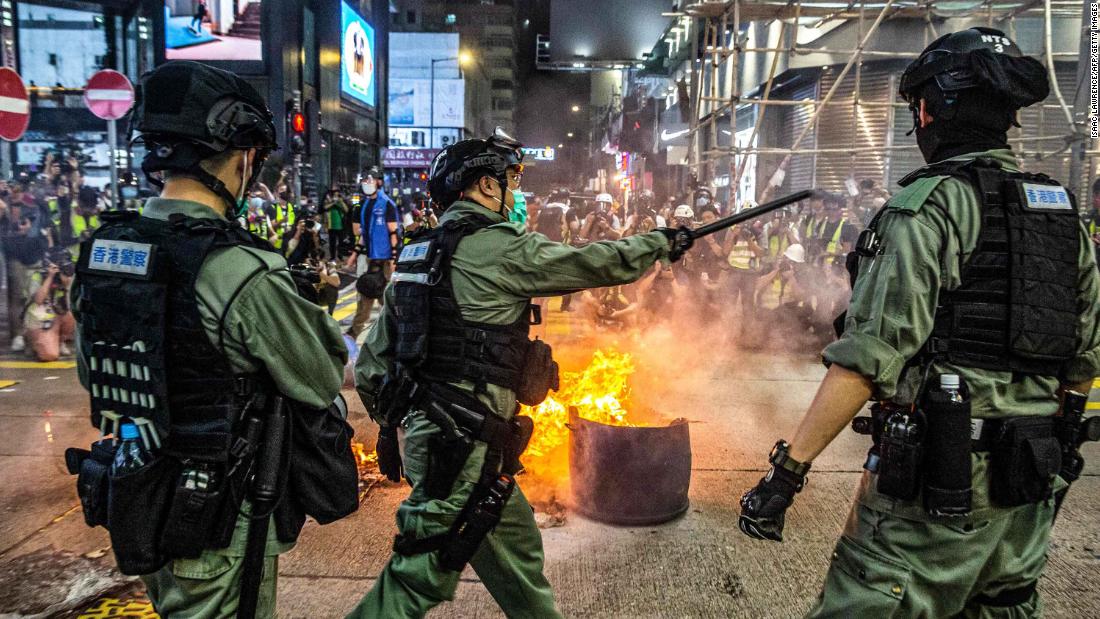Hong Kong (CNN)Since Beijing revealed plans to impose a nationwide security law on Hong Kong, defenders of the bill rep argued that fears of what it goes to furthermore attain to the metropolis’s political freedoms and civil liberties are overblown.
The law is exclusively plugging a loophole, they claimed, and isn’t any longer any assorted to what many assorted international locations rep on the books. Local officials and illustrious agencies threw their weight within the aid of the bill — search for unseen — promising that it might per chance per chance leave the metropolis better off, and on the least, would handiest affect a handful of of us.
On Saturday, China’s National Of us’s Congress (NPC), which is anticipated to scamper the law in coming weeks, gave Hong Kong its first search for of what it incorporates. The critics might per chance furthermore rep been real to be terrorized: as drafted, the law looks to upend the metropolis’s prized independent actual plan, allowing Beijing to override native laws while bettering its ability to suppress political opposition.
Most controversially, the law offers Beijing the vitality to teach jurisdiction over receive criminal circumstances, elevating the probability that for the first time in Hong Kong’s history, suspects would be extradited across the border to face trial, and potentially penal complex time, within the mainland.
Fears of correct that had been what drove protests in opposition to an extradition bill final one year that became proposed by the Hong Kong authorities. Those protests in a roundabout plan compelled the abandonment of that law, however spiraled into broader anti-authorities unrest that, Beijing says, required the imposition of the contemporary nationwide security guidelines.
Antony Dapiran, a lawyer and political analyst based in Hong Kong, described the contemporary law as a “gargantuan-based vitality hold by Beijing” over most of the principle parts of authorities and society.
Writing on Twitter, he said the contemporary law “effectively sets up a parallel judiciary (and) takes interpretation and final adjudication vitality some distance from Hong Kong courts.”
In an announcement, the metropolis’s chief govt, Carrie Lam, said the law would originate certain “the lengthy-term prosperity and steadiness of Hong Kong,” reiterated that it might per chance per chance “handiest goal an especially dinky minority of of us” and said the proposed bill became “per the guideline of law” and the “rights and freedoms which would be appropriate in Hong Kong below the Standard Regulation and related international covenants.”
Fresh plan
When Hong Kong became handed over from British to Chinese rule in 1997, the metropolis’s general law plan remained largely intact. Precedent remained in power, and protections below the contemporary de facto structure, Standard Regulation, as well to assorted international treaties, guaranteed a level of equity and freedom no longer viewed in China, the place the conviction rate is north of 90%.
Whereas the NPC did produce the flexibility to “elaborate” Standard Regulation, essentially rewriting it in whisk circumstances, the central authorities did no longer rep any jurisdiction over particular individual circumstances, nor might per chance furthermore of us be tried for crimes in opposition to Beijing that had been no longer unlawful in Hong Kong.
The contemporary nationwide security law would alternate all of that. In step with particular aspects published over the weekend, Chinese security organs can rep the vitality to “teach jurisdiction” over nationwide security circumstances “below jabber circumstances,” while assorted prosecutions below the law shall be heard by a panel of judges picked by the metropolis’s Beijing-appointed chief.
It would no longer jabber explicitly whether suspects might per chance furthermore face extradition to mainland China below such circumstances.
Though the draft did originate reference to upholding the “rule of law” and diverse civil liberties, it furthermore subordinates existing law to the nationwide security bill, so that the place there is a warfare, the nationwide security law prevails. In educate, this would per chance furthermore mean that once a nationwide security prosecution contravenes human rights stable below Hong Kong law, these rights are suspended.
Writing after the Saturday announcement, Jerome Cohen, an professional on Chinese law, pushed apart the “ogle candy” on human rights, bringing up that the “very provisions within the draft (law) would seem to violate these protections.”
“The Handover has clearly turn into the Takeover,” Cohen added.
Kevin Yam, a Hong Kong-based solicitor and primitive convenor of the Revolutionary Attorneys Community, said the proposed law became no longer price actual interpretation, in conjunction with “there is nothing to study.”
“It be correct whatever they jabber it is,” he added. “And within the event that they can not originate it whatever they jabber it is after they wish one thing, they can correct alternate it in whatever manner they enjoy.”
Judicial maneuvers
Whereas there became no advice of a unswerving public consultation or referendum on the bill, more than one provisions revealed Saturday seemed geared in direction of allaying Hong Kongers’ fears over it, or as a minimal easing its selling to the final public.
Such provisions near amid a broad propaganda effort to sell the bill, with posters and adverts selling it plastering Hong Kong, as well to an obvious push by Beijing for Chinese corporations to re-listing on the metropolis’s inventory alternate, boosting the native financial system.
Particularly, the appearance of a panel, nominated by Chief Executive Carrie Lam, to listen to nationwide security circumstances, might per chance furthermore rep been a sop to of us who had been expressing dread at reports the bill would bar international-born judges from hearing them. As phase of the broader general law plan, which furthermore contains the UK, Canada, Australia and a alternative of assorted jurisdictions, Hong Kong periodically appoints illustrious “non-eternal” judges to the Court docket of Closing Appeal.
These judges are appointed by the chief govt, however their presence in whisk circumstances has been controversial in China, ensuing in calls for his or her removal, or barring them from whisk sensitive circumstances. By giving Lam the vitality to nominate judges to listen to nationwide security circumstances, the authorities essentially sidesteps this scrape, enabling her to rating these judges deemed most valid.
The Hong Kong Bar Affiliation has blasted the plans as “unprecedented” and a fundamental blow to judicial independence, bringing up that Lam shall be appointing a panel to oversee circumstances whereby she herself is an involved birthday celebration.
Chatting with native media, Bar Affiliation head Philip Dykes said the law became a “recipe for warfare of hobby,” and would enable Lam to “cherry-take care of” which judges heard essentially the most controversial circumstances.
Alvin Yeung, an opposition lawmaker and barrister, said the proposal became a “whisk departure from general law traditions.”
Political prosecutions
Expanding the vitality of Chinese courts and security products and companies to Hong Kong carries with it rather more concerns.
Permitting China’s security equipment to characteristic within the metropolis raises the specter of extralegal persecution. Dissidents and activists in China are generally disappeared by the authorities or threatened with arrest round sensitive events, and lots of journalists and lawyers are dragged in to “use tea” with the safety products and companies, all the plan by plan of which they receive thinly-veiled threats about the aptitude penalties of their work.
Giving Chinese courts jurisdiction “below jabber circumstances,” within the meantime, will probably guarantee convictions in these circumstances. China’s actual plan has been broadly criticized for its lack of human rights protections, nakedly political prosecutions, and a virtually current conviction rate. The country’s bask in nationwide security law has been interpreted broadly within the previous to imprison activists, intellectuals and journalists.
Two Canadians prosecuted final week for spying are a pertinent instance of this. Michael Kovrig and Michael Spavor had been arrested in gradual 2018 at this time after the detention in Canada of Huawei govt Meng Wanzhou. Whereas China argues there is “solid” evidence in opposition to the two men, Canada views the case as “arbitrary” and politically-motivated.
Kovrig and Spavor are furthermore an instance of how nationwide security legislation in China differs to that in democratic international locations. Canada, shall we embrace, has laws in opposition to espionage and spying, and of us rep been prosecuted below them.
The variation is that these laws and the corresponding prosecutions must conform to the Canadian Constitution of Rights and Freedoms, the country’s bill of rights, and would be struck down had been they found by a court to be unconstitutional.
Here’s no longer the case in China, and might per chance furthermore at this time no longer be the case in Hong Kong, if the proposal for the law goes ahead. Whereas China does point out whisk rights in its structure, these are subordinate to the law, no longer overriding. Freedom of expression, religion and the clicking exist in principle, however “might per chance furthermore no longer infringe upon the pursuits of the Articulate.”
Equally, Hong Kong ensures rights below Standard Regulation and by plan of being a signatory to international conventions, however the nationwide security law as drafted would override these protections.
Of us that strive to whine their constitutionally-stable rights in China are generally prosecuted on the grounds of nationwide security, comparable to Nobel Peace Prize laureate Liu Xiaobo, who died in 2017 after years in penal complex on costs of “inciting subversion of teach vitality.” Liu’s most famed work, Constitution 08, of which he became a co-creator, known as in phase for judges so as to “uphold the authority of the Constitution.”





Leave a comment
Sign in to post your comment or sign-up if you don't have any account.